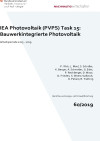Suchergebnisse für "Factsheet: Energietechnologien gestalten, die für alle sinnvoll und nutzbar sind"
IEA Bioenergy: Österreich Newsletter November 2021
In der vierten Ausgabe des Newsletters werden Highlights aus den österreichischen Beteiligungen an den Tasks des IEA Bioenergy Netzwerkes vorgestellt sowie Projekte, Veröffentlichungen und Veranstaltungen präsentiert.
IEA Bioenergy Task 39: Newsletter, Ausgabe 56, Dezember 2020

Der Schwerpunkt dieser Ausgabe liegt auf einem Artikel zum Thema „India Biofuel economy roadmap – Challenges & Prospects“.
Mahmood Ebadian, Jack Saddler, Jim McMillan
Herausgeber: IEA Bioenergy Task 39, 2020
Englisch, 23 Seiten
Downloads zur Publikation
IEA Bioenergy Task 39: Newsletter, Ausgabe 58, Dezember 2021

Der Schwerpunkt dieser Ausgabe liegt auf dem Artikel zum Thema „Biofuels Policies and Market in Norway“.
Mahmood Ebadian, Jack Saddler, Jim McMillan
Herausgeber: IEA Bioenergy Task 39, 2021
Englisch, 23 Seiten
Downloads zur Publikation
Artikel: Normung der Charakterisierung von Phasenübergangsmaterialien mittels dynamischer Differenzkalorimetern

Entwicklung standardisierter Messverfahren zur Bestimmung der Enthalpie-Kurven von Phasenwechselmaterialien
Mehrsprachig
IEA SHC Task 68: Konferenz CEBC 2023 Beitrag "Opportunities offered by long-term heat storages and large-scale solar thermal systems"

Präsentation im Rahmen des "IEA Cross TCP Workshop: Towards a flexible, cross sectoral energy supply" der CEBC 2023 in Graz, Österreich.
Viktor Unterberger
Herausgeber: BEST - BIOENERGY 2020+ GmbH
Englisch
Rückblick: IEA Vernetzungsworkshop 2011
Am 9ten März fand der jährliche Vernetzungsworkshop der nationalen Akteure innerhalb der IEA-Forschungskooperation statt. Mit ca. 50 TeilnehmerInnen war der Workshop ein voller Erfolg und bot den Anwesenden einen umfassenden Überblick über aktuelle Themen der Internationalen Energieagentur (IEA).
IEA AFC Annex 35: High purity hydrogen production with a 10kWth RESC prototype system (2018)

Demonstration eines Laborprototyps zur dezentralen Herstellung von hochreinem Wasserstoff aus Methan.
S. Bock, R. Zacharias, V. Hacker
Herausgeber: Elsevier, Energy Conversion and Management
Englisch, 10 Seiten
IEA SHC Task 55: Solar Heat Networks: Policy, Planning, Design and Performance (2019)

Im Bericht wird das Solar Academy Training vorgestellt, das in London am 8. März 2019 abgehalten wurde.
Richard Hall
Herausgeber: IEA SHC, 2019
Englisch, 9 Seiten
Downloads zur Publikation
IEA DHC Annex TS3: Proceedings of the Webinar on “Hybrid Energy Networks” (2021)

Präsentationsunterlagen des Webinars am 27. April 2021 mit dem Schwerpunkt auf Hybride Energiesysteme.
Herausgeber: IEA DHC Annex TS3, 2021
Englisch, 278 Seiten
IEA Photovoltaik (PVPS) Task 15: Bauwerkintegrierte Photovoltaik

Bauwerksintegrierte Photovoltaik (BIPV) ist eines der Zukunftsfelder in der Photovoltaik, welches Energietechnik und Architektur zu einem Element zusammenführt. Das Projekt fokussierte sich auf zusätzliche nationale Forschung im Bereich der BIPV, um neue Geschäftsfelder zu identifizieren oder Ansätze zur internationalen BIPV Standardisierung zu entwickeln.
Schriftenreihe
60/2019
P. Illich, L. Maul, S. Schidler, K. Berger, A. Schneider, G. Eder, P. Rechberger, D. Moor, D. Frieden, S. Woess-Gallasch, G. Peharz, R. Trattnig
Herausgeber: BMVIT
Mehrsprachig, 75 Seiten
Downloads zur Publikation
IEA Bioenergie Task 42 - Nationales Stakeholder Vernetzungstreffen
15. Januar 2020
Festsaal BOKU, Gregor-Mendel-Straße 33, 1180 Wien, AT
Beim nationalen Vernetzungstreffen der Bioraffinerie-AkteurInnen in Österreich wurde unter anderem das neue COMET K1 Competence Center CHASE (Chemical Systems Engineering) vorgestellt.
Advanced Lighting Solutions for Retrofitting Buildings
21. März 2017
online
Als eine der Maßnahmen zur Verbreitung der Ergebnisse von IEA Solar Heating and Cooling Tasks bietet das IEA SHC Programm eine Serie von Webinars an. Das erste Webinar im Rahmen der der Solar Academy widmet sich den Ergebnissen der Task 50 "Advanced Lighting Solutions for Retrofitting Buidlings".
IEA Bioenergie Task 42 "Biorefining" Brochure 2014 jetzt online!
Report zu den Aktivitäten des IEA-Task 42 "Biorefining" mit Beiträgen aus den 11 Mitgliedsländern. Schwerpunkt liegt auf der Darstellung von 30 Beispielen zu Bioraffinerien in den Mitgliedsländern sowie der Klassifizierungsmethode von Bioraffinerien, der Nachhaltigkeitsbewertung und dem "Biorefinery Fact Sheet"
IEA SHC Task 68 Peer-reviewed Journal Paper 2023: Fault detective - Automatic fault-detection for solar thermal systems based on artificial intelligence

In diesen Open-Access Paper wird ein Algorithmus zur automatischen Fehlerdetektion vorgestellt, der an drei solarthermischen Großanlagen getestet wurde.
Feierl L, Unterberger V, Rossi C, Gerardts B, Gaetani M
Herausgeber: SOLID Solar Energy Systems GmbH, 2023
Englisch, 17 Seiten
IEA DHC Annex TS4: Guidebook for the Digitalisation of District Heating: Transforming Heat Networks for a Sustainable Future (2023)

Abschlussbericht des Projektes “IEA DHC Annex TS4“ zur Digitalisierung der Fernwärme
Schmidt, Dietrich (ed.) et al.
Herausgeber: IEA DHC Annex TS4, 2023
Englisch, 156 Seiten
Conference: Smart Grids Week - Salzburg 2013
13th to 17th of May 2013
Salzburg Congress and Salzburg AG5020 Salzburg, AT
The Smart Grids Week - Salzburg 2013 aims to significantly contribute to the further development of electricity infrastructures.
Fachgespräch Bioenergieforschung 2014
21. November 2014
BMVIT, Radetzkystraße 2Wien, AT
Berichte der österreichischen Delegierten zu aktuellen Entwicklungen in den Tasks des IEA Implementing Agreements "Bioenergy" sowie Input durch Vertreter der Industrie.
IEA SHC Task 55: Newsletter Februar 2017

Der Newsletter informiert über das geplante 2. IEA SHC Task 55 Meeting.
Putz, Sabine; Provasnek, Anna Katharina
Englisch
Downloads zur Publikation
Neue Publikationen des IEA SHC Task 59/EBC Annex 76: Ganzheitliche Sanierung von historischen Gebäuden
Im IEA SHC Task 59/EBC Annex 76 wurden vier neue Publikationen rund um das Thema "Ganzheitliche Sanierung von historischen Gebäuden" veröffentlicht.
IEA EBC Annex 55: Reliability of Energy Efficient Building Retrofitting - Probability Assessment of Performance & Cost (RAP-RETRO)
The scope of the project is to develop and provide decision support data and tools for energy retrofitting measures. The tools will be based on probabilistic methodologies for prediction of energy use, life cycle cost and functional performance. The impact of uncertainty on the performance and costs will be considered. Methods based on probability give powerful tools that can provide us with reliable ranges for the outcome.
